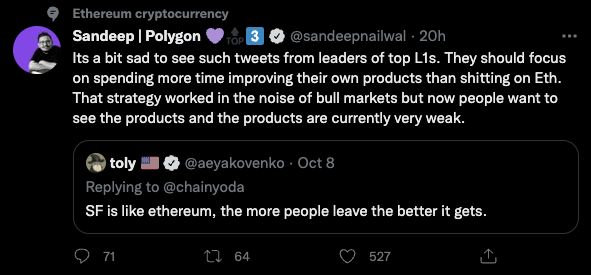Recently, Solana Labs Co-Founder Anatoly Yakovenko attacked Ethereum by saying that it is kind of like the city of San Francisco in that the more people that leave, the better it will be.
Here is how Coinbase described Solana in a blog post published on 29 June 2022:
“Solana is a decentralized computing platform that uses SOL to pay for transactions. Solana aims to improve blockchain scalability by using a combination of proof of stake consensus and so-called proof of history. As a result, Solana claims to be able to support 50,000 transactions per second without sacrificing decentralization, and is one of the largest proof of stake blockchains by market cap.
“Solana aims to enable smart contracts to allow developers to build a wide range of decentralized finance (DeFi) apps, new crypto tokens, games, and more. When users stake their crypto, they make the underlying blockchain of that asset more secure and more efficient. And in exchange, they are rewarded with additional assets from the network, which are paid out as rewards.“
Yakovenko’s attack on Solana rival Ethereum took place on Twitter on October 8, and Polygon Co-Founder and COO Sandeep Nailwal made his response to it yesterday (October 16). Nailwal believes that the leaders of the development teams for the top layer one (L1) blockchains — such as Ethereum, Cardano, and Solana — should not be attacking each other.

Interestingly, last month, Charles Hoskinson, who is Co-Founder and CEO of Input Output Global (“IOG”), the blockchain technology company behind Cardano’s R&D, expressed his disappointment with Ethereum’s staking model.
It all started on 15 September 2022, when one Cardano fan pointed out that Kraken has recently told its users that $ETH unstaking will not be available until Ethereum has its Shanghai protocol upgrade, which is expected sometime next year.
Hoskinson then sent out a tweet that mocked Ethereum’s proof-of-stake (PoS) model by subtly noting that Cardano’s PoS design and implementation does not suffer from this problem:
On 16 September 2022, after $ADA stake pool operator pointed out that no date has been announced for Ethereum’s Shanghai upgrade, the IOG CEO compared the situation that $ETH stakers find themselves in to being stuck in “Hotel California”.
As you may know, “Hotel California” is “the title track from the Eagles’ album of the same name and was released as a single in February 1977.” This is the last part of the song:
“Last thing I remember, I was
Running for the door
I had to find the passage back
To the place I was before
‘Relax, ‘ said the night man
‘We are programmed to receive
You can check out any time you like
But you can never leave’“
As for Solana, in a recent interview, Yakovenko talked about how Solana managed — over the past 18 months — to “catapult” itself to the position of one of Ethereum’s major L1 blockchain rivals.
His comments were made during a conversation on September 21 with Ryan Selkis, Co-Founder and CEO at Messari, at Messari’s annual conference Mainnet (September 21-23, 2022) in New York City.
Yakovenko told Selkis:
“I’d love to say that it was like brilliant strategy, but it was really I think a function of necessity. We never had a ton of runway. There are always like 20 months or lower. So 12 engineers, a very scrapy team, over two years, we built the bare minimum to prove that a fast blockchain that has parallel execution is possible. That meant no EVM support, no Ethereum-like features.
“We literally just could demo, look, this thing could run something like zero. And that was it. And that was the right thing to do because devs saw a new technology that gave them new capabilities and they were curious and engineers are naturally curious. And that allowed us to build a small ecosystem of folks… eating glass was like our mantra at the time.
“Now, it’s more like surfing glass, but at that time I was really really rough. The only developer tool we got that we gave people was basically equivalent to a Linux system call. So it was very very low level programming, but it was cheap and fast and a new primitive for parallel execution and that that was really what allowed us to differentiate and build our own community.“
Yakovenko also talked about Saga, which is a new mobile phone introduced on 23 June 2022 that is being developed as the result of a collaboration between Solana Mobile, a subsidiary of Solana Labs, and OSOM.
As he was showing a Sega phone prototype to Selkis, Yakovenko said:
“It’s awesome….This is built by an amazing OEM: OSOM. Jason Keats is the founder. He was the architect of iPad Pro. He’s like an amazing hardware engineer… He loves materials and hardware and making a beautiful device and we’re working on the crypto software part of it, the Solana Mobile Stack.
“And this all came about because there are two things happening in crypto. Applications are getting more sophisticated and they’re dealing with much more complex media and interactions, and self-custody is still dangerous and sucks.
“And when you look at your phone, you kind of feel like, ‘why isn’t this my hardware wallet?’ Why are we storing seed phrases inside the application that’s doing all these very complicated things? So that was part one, and part two is [that] decentralisation is enabling true real-world digital assets. That’s just never been done before. When you buy a movie from Amazon — buy to own — actually all that content you’re renting it from Amazon for that 20 bucks forever and it may disappears sometime in the future… So they own the content at the end of the day.
“But with Web3, the user generates the content and the user owns it and Magic Eden can’t to add a 30% tax on that content in the mobile app. There’s no way you can take a $10,000 NFT and sell it for $13,000 in the iOS app store, and they can’t eat that cost either.
“So the business model just doesn’t work. Web3 is about true digital assets being real things. That means they have to be treated like physical items, and that really hurts all the folks that Apple and Google want to take 20% to 30% off of [for] every digital transaction.
“So these two things coming together is a big opportunity. Can we make the signing experience awesome and delightful like Apple Pay? Can we make custody as simple as just owning your phone? And can we give devs an app store where crypto is treated as a first-class citizen?“
Image Credit
Featured Image via Pixabay









